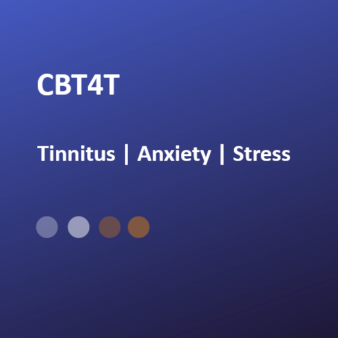Pascal, France
8 weeks post-enrolment: Stage 4 - Tinnitus Functional Index reduced from 56.8% > 15.2% (category 4 big problem > category 1 not a problem)
Following these repeat measures and a first appointment, Pascal's feedback is:
Q: The progress I have achieved indicated in my stage 4 repeat Tinnitus Functional Index (TFI):
A: "My progress was more than I was expecting when I enrolled on CBT4T"
Q: The progress I have achieved indicated in my stage 4 repeat Anxiety/stress Symptoms (ASQ):
A: "My progress more than I was expecting when I enrolled on CBT4T"
Q: What do you believe to have been the most impactful aspect(s) up to Stage 4 for you? Choose as many as you like:
A:
1. Breathing exercises
2. Physiological exercises (9 minutes)
4. Learning about the Amygdala
5. Understanding more about the Change Process
6. Recognising how many 2nd, 3rd, 4th etc “Arrows” cause you emotional distress
7. Recognising how much Cognitive Distortions cause you emotional distress
8. There is a difference between having a Problem-oriented perspective and a Recovery-oriented perspective
Q: Of the above impactful aspects you have chosen, pick your top three (or more) in order of importance for you
A:
1. Breathing and physiological relaxation exercises
2. Learning about the amygdala and the autonomic response
3. Understanding more about the change process
4.Recognizing how much cognitive distorsions cause emotional distress
5. Difference between a problem-oriented perspective and a recovery-oriented perspective
Q: Are there any further aspects that you would like to add?
A: "As a medical practitioner, I have been impressed by the breadth and depth of science underpinning the CBT4T programme. In particular it was very interesting learning more about the neuroscience behind CBT in general and CBT4T in particular, as well as recovery-oriented strategies using brain's neuroplasticity. Another aspect is the standardized tests that allow measurement of progress. In my case, I feel that the progress I have made up to this point is the result of several factors: 1) understanding the science behind tinnitus, the emotional response and CBT4T, 2) breathing/relaxation exercises, 3) antidepressants (to reduce anxiety and obsessive monitoring of tinnitus), 4) hearing aids (I realized that I had moderate hearing loss at higher frequencies), and last but not least the resumption of physical activities. Finally, the relaxation logs and SITREP are important elements of individual commitment and accountability."
Q: Please write about your experiences so far (up to Stage 4/starting Stage 5)
A: "My experience so far is positive. As I said, I feel that somehow the tinnitus experience is also an opportunity to apply CBT principles to my life more generally and how I deal with stressors and negative thoughts. I am sure more will come in the next stages."
Q: Would you recommend CBT4T to others looking for help, based on your experience of the course so far, and why?
A: "Yes, I would definitely recommend the course to people who suffer from tinnitus."
